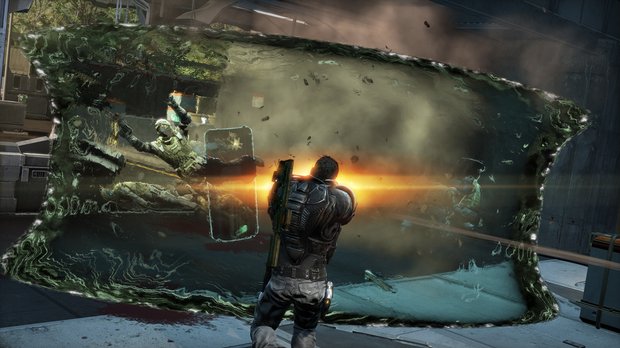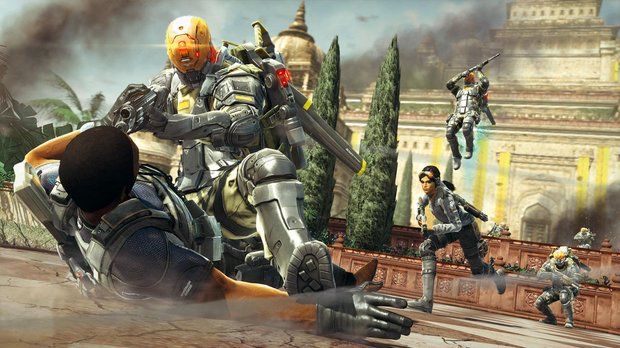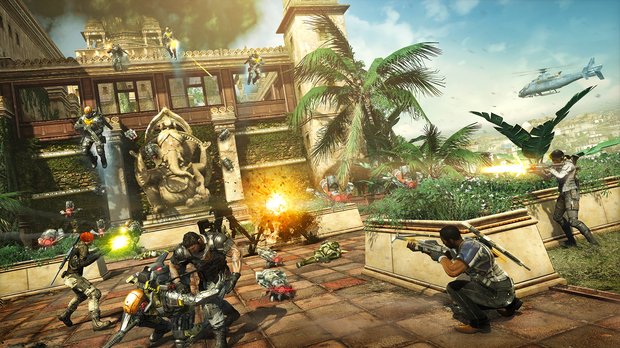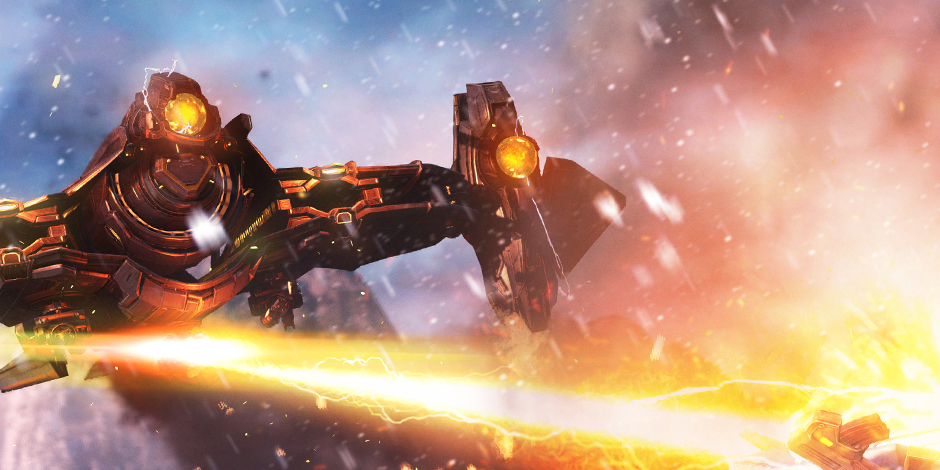GamesRadar+ Verdict
Pros
- +
The awesome gun effects
- +
Frenetic teamwork in four-player co-op
- +
The smooth controls
Cons
- -
Firearms feel underpowered
- -
Superfluous RPG elements
- -
Repetition and constant interruptions
Why you can trust GamesRadar+
What goes up must come down. Oddly enough, that's an appropriate description of what it's like to play Fuse. The awesome effects of its inventive weapons will rocket you into a state of euphoria, a wonderland filled with firearms whose bullets create vaporizing energy blasts and explosive miniature black holes. But just as you start to get all hot and bothered, you'll be ripped from your gun-induced high by jarring interruptions, painfully generic enemies, and a sterile presentation.
Its cliche premise pits four operatives--belonging to the organization known as Overstrike 9--against a by-the-numbers world-threatening agency. While Fuse's characters do have a bit of personality and participate in some occasionally fun banter, the real stars of the show are their unique weapons. There's the bullet-blocking Mag Shield; a Warp Rifle that creates the aforementioned black holes; a crystallizing crowd-control firearm called the Shattergun; and the Archshot crossbow that immolates enemies on impact.
Thankfully, you don't have to commit to just one agent for the long haul. Though each of the iconic Fuse weapons are specific to a single character, you can swap between squad members freely so long as the agent you want to jump into isn't being controlled by another player. This easy-to-execute maneuver lets you get a taste of each of the special guns, keeping firefights from feeling too stale throughout the eight-hour campaign.

"...the real stars of the show are [the] unique weapons."
Best of all, gun effects can be chained together to produce some truly awesome kill combos. Shoot an enemy with the Arcshot through the Mag Shield, and your bolts will pack a little extra punch. This incentivizes teamwork during cooperative play, which is practically mandatory if you hope to overcome the grueling challenge of Fuse's later levels, or its brutal wave-based Echelon mode. Should you choose to play solo in either mode, AI will take control of unmanned agents--but its reliability is sporadic at best. Sometimes AI teammates will work almost as effectively as real players; other times, they'll stand back while you do all the shooting. Playing with others makes for a far more enjoyable experience.
Still, company doesn't negate the repetitive nature of Fuse's design. Each enemy-filled arena is followed by another, and you'll spend a majority of your time holding down the right trigger, destroying armies of uninteresting bad guys. Problem is, the act of shooting is dull in comparison to the end result produced by Fuse guns. They sound puny when fired, and you'll have to unload dozens of bullets into enemies before they go down--a situation that's amplified once you run out of special Fuse ammo and are forced to resort to run-of-the-mill assault rifles, shotguns, and pistols, which sound and feel even weaker. Enemies are bullet sponges because you're meant to take full advantage of the crowd control and damage mitigation abilities at your disposal. Ultimately, though, their massive health pools make weapons feel too underpowered.

"...you'll spend a majority of your time holding down the right trigger, destroying armies of uninteresting bad guys."
Even more problematic are the intrusive rally points that punctuate combat encounters, requiring the presence of all four characters before allowing you to progress. You'll pull a lever, kill 70 bad guys, then pry open yet another steel door to do it all over again. These checkpoints are frequent and can bring multiplayer sessions to a dead stop whenever a player decides to troll by refusing to stand in the correct spot, or take a break without letting anyone know.
Then there's the superficial progression system. Every action, including the chaining of weapon effects, yields experience points, which are used to marginally increase the potency of your Fuse weapons and other abilities. At first glance, this imbues your character with a degree of customization--until you realize that all four agents have the same exact singular skill tree, save for a few character-specific upgrades. There's no way to differentiate your playstyle from that of anyone else aside from choosing which Fuse gun you like the best.

"There's no way to differentiate your playstyle from that of anyone else aside from choosing which Fuse gun you like the best."
That's not to say Fuse doesn't have its merits. The control scheme is brilliant in its fluidity: It takes almost no effort to slide into cover, perform an awesome-looking melee kill, vault over a chest-high barricade, and take cover once more before tossing a grenade. When the battles get huge and you're slinging hot lead with a few pals, Fuse becomes a genuinely enjoyable if not mindless experience.
But that's a best-case scenario. For every aspect Fuse gets right, another bogs it down. Its special guns do some amazing things, but they're boring to shoot. Its tight, responsive controls means it plays like a dream, but they merely offset the tedium that comes with blasting away thousands of generic enemies. And its progression system gives you something to strive for--until you give it a once-over and find useful upgrades to be few and far between. Those hungry for a new co-op game will definitely find some enjoyment here. Just don't expect to stay satiated for long.
This game was reviewed on PS3.
More info
| Genre | Action |
| Description | Previously named OverStrike and now retitled Fuse is about a quartet of special elite agents who target enemy strongholds using fringe-tech gadgets and lethal teamwork. |
| Platform | "Xbox 360","PS3" |
| US censor rating | "Mature","Mature" |
| UK censor rating | "","" |
| Alternative names | "Overstrike" |
| Release date | 1 January 1970 (US), 1 January 1970 (UK) |
Ryan was once the Executive Editor of GamesRadar, before moving into the world of games development. He worked as a Brand Manager at EA, and then at Bethesda Softworks, before moving to 2K. He briefly went back to EA and is now the Director of Global Marketing Strategy at 2K.




